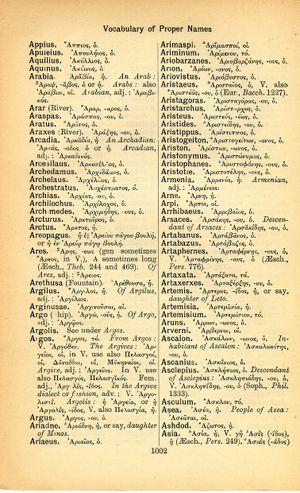Artemisia: Difference between revisions
Περὶ τοῦ ἐπέκεινα τοῦ νοῦ κατὰ μὲν νόησιν πολλὰ λέγεται, θεωρεῖται δὲ ἀνοησίᾳ κρείττονι νοήσεως → On the subject of that which is beyond intellect, many statements are made on the basis of intellection, but it may be immediately cognised only by means of a non-intellection superior to intellection
m (Text replacement - "link={{" to "link={{") |
m (Text replacement - "}}]]" to "}}]]") |
||
| Line 1: | Line 1: | ||
{{WoodhouseENELnames | {{WoodhouseENELnames | ||
|Text=[[File:woodhouse_1002.jpg|thumb | |Text=[[File:woodhouse_1002.jpg|thumb | ||
|link={{filepath:woodhouse_1002.jpg | |link={{filepath:woodhouse_1002.jpg}}]]Ἀρτεμισία, ἡ. | ||
}} | }} | ||
{{Lewis | {{Lewis | ||
Revision as of 10:11, 15 August 2017
English > Greek (Woodhouse)
Ἀρτεμισία, ἡ.
Latin > English (Lewis & Short)
Artĕmĭsĭa: ae, f., = Ἄρτεμισία.
I Wife of King Mausolus, in Caria, to whom, after his death, she built the renowned Mausoleum, Gell. 10, 18.—
II artĕmĭsĭa, ae, f., the plant mugwort, Plin. 25, 7, 36, § 73; App. Herb. 10.
Latin > French (Gaffiot 2016)
(2) Artĕmīsĭa, æ, f.,
1 Artémise [femme de Mausole, reine de Carie] : Cic. Tusc. 3, 75 ; Gell. 10, 18, 1
2 île de la mer Tyrrhénienne : Plin. 3, 81.
Latin > German (Georges)
(1) Artemīsia1, ae, f. (Ἀρτεμισία), Königin in Karien, die ihrem Gemahl Mausolus ein prächtiges Grabmal errichtete, Gell. 10, 18, 3 sqq.; vgl. Cic. Tusc. 3, 75. Val. Max. 4, 6. ext. 1.

